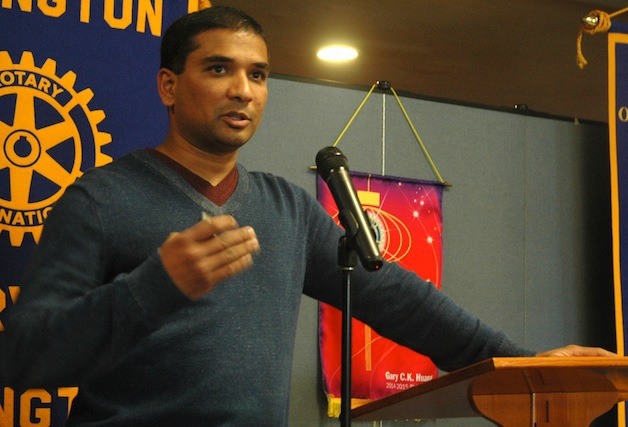ARLINGTON — Krishna Nadella was frank in describing MicroGreen Polymers as “a high-profile failure,” but it hasn’t made him shy about starting a second company in Arlington.
Nadella, the CEO and founder of Aiooa, spoke to the Rotary Club of Arlington May 14 about his new company and MicroGreen, which he cofounded in 2002 and moved to Arlington in 2006.
He and MicroGreen cofounder Greg Branch, who lived in Stanwood, chose to relocate the company from Seattle because it was as far south as was affordable for them.
“Once we set up shop here, I realized what amazing assets this location had,” Nadella said.
MicroGreen boasted 175 employees at its peak, 140 of whom were in manufacturing, and most of whom lived within a five- to 10-mile radius of the company’s 10,000-square-foot facility at the Arlington Airport.
MicroGreen drew $80 million from an assortment of investors, but its operations shut down after one of its largest backers, the Confederated Tribes of the Grand Ronde in Oregon, foreclosed on the company. This has made Nadella reluctant to rely too much on outside investors for Aiooa.
“It’s better to grow your own revenues,” said Nadella, who paid no heed to those who told him to move his manufacturing to China. “I already moved to America, so why would I want to leave? Arlington offers the right mix of talent in high tech with a gut-sense understanding of the materials.”
Nadella also touted Arlington’s access to I-5, Highway 9 and Highway 530, as well as its proximity to outdoor recreational opportunities favored by employees in his field.
While MicroGreen focused specifically on creating eco-friendly, lightweight cups, Aiooa will cover the engineering, procurement and construction of manufacturing systems for a variety of cellular materials, from foam to metal with micro-bubbles.
“We failed as a manufacturer of low-cost items, but now we’re designing all new products and equipment,” Nadella said.
Aiooa is starting with a core group of 10 members of MicroGreen, including its former director of engineering, Tony La Salata, and plans to utilize its connections with universities to bring their technological ideas to the marketplace.
Employees like La Salata are another reason why Nadella wanted to keep his business in Arlington, since he reasoned that the company would be better off if he commuted 45 minutes north each morning, rather than having them drive 45 minutes south.
Nadella also praised Arlington Mayor Barbara Tolbert for calling the Department of Commerce to ask if they could aid MicroGreen in any way.
“I would not have been met by the mayor of Seattle in the same situation,” Nadella said. “She has a special interest in ensuring that talent stays in her city.”
Nadella likewise credited Arlington High School Class of 2013 graduate Dan Radion with applying his Robotics Club skills to MicroGreen’s assembly lines.
“He programmed all our machines within two months,” Nadella said of Radion.
Nadella sees AHS as a hub of educational opportunities in the field, from its manufacturing academy and Science, Technology, Engineering and Mathematics curriculum to its Aerospace Joint Apprenticeship Committee apprenticeships.
While Nadella expressed confidence, he also noted that nine out of 10 high-tech start-ups end in failure, and asserted that he could offer no assurances.
“We were about seven to eight months away from breaking even, and two to three years away from a net profit,” Nadella said of MicroGreen.







